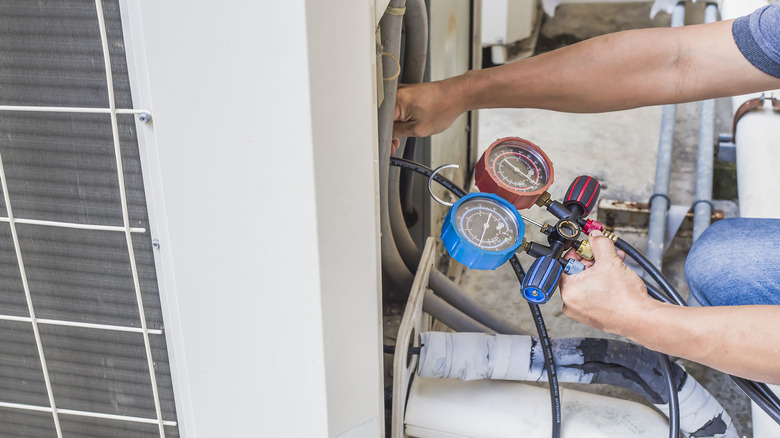Refrigerant Overcharge Problems
We may receive a commission on purchases made from links.
It might seem like extra refrigerant is a good thing that would make your home feel cooler, but too much refrigerant can lead to refrigerant overcharge problems ranging from higher energy bills to expensive repairs or a full replacement. Your HVAC system needs just the right amount of refrigerant to cool your home without damaging the unit. Too much or too little refrigerant keeps the system from cooling properly and can result in damage that requires you to replace your HVAC system. Refrigerant overcharge problems include increased system pressure, difficulty changing between gas and liquid states, compressor damage and inefficient operation.
How Refrigerant Overcharge Happens
How Refrigerant Overcharge Happens
When your central air works correctly, you never need to add more refrigerant. Doing regular air conditioner maintenance and scheduling yearly professional inspections can prevent major problems, but sometimes, the unit can develop a leak, which causes it to lose refrigerant and keeps the system from cooling like it should. The leak needs to be repaired, and more refrigerant must be added to get the system running normally again.
The EPA limits refrigerant sales to licensed technicians. You should never try to add any type of refrigerant to your AC yourself, and you shouldn't let anyone other than a licensed HVAC technician add refrigerant. Someone who isn't experienced and properly trained might add too much refrigerant, creating a refrigerant overcharge situation. It might not seem like a big deal, but it can cause serious damage to your air conditioner.
Too Much Liquid Refrigerant
Too Much Liquid Refrigerant
When your air conditioner runs, the refrigerant switches between liquid and gaseous states. Excess refrigerant keeps more of it in the liquid state. This can lead to lots of other problems in the system, including inefficiency, inability to cool and increased pressure.
It also exposes the compressor to damage. Your compressor might have to work harder to do its job. There's also a risk that the liquid refrigerant will enter the compressor, where it mixes with oil and causes the compressor to burn out. A damaged compressor typically means you'll need to replace the entire unit since the compressor is costly to replace.
Increased System Pressure
Increased System Pressure
Refrigerant overcharging increases the pressure in the system, which can gradually cause problems. It can decrease the efficiency of the system, which makes it more difficult to cool the home. If you notice that the AC isn't keeping up or your utility bills are increasing, it could be due to overcharging, especially if you recently had more refrigerant added to your system.
If you've never had refrigerant added to your system, the lack of cooling or increased bills could be due to other issues, such as air filters that need to be replaced. It's a good idea to schedule a professional tune-up to have the problem diagnosed by a licensed HVAC professional.
Hot Air From Vents
Hot Air From Vents
More refrigerant doesn't equal cooler temperatures even though that seems like the logical effect. Instead, the extra refrigerant creates more heat production. Overworked motors create the increased heat. The unit might also have trouble creating enough cooled air, so your house might feel warmer than usual without ever reaching the cool temperature you set.
Complete HVAC Shutdown
Complete HVAC Shutdown
Too much refrigerant can eventually cause the air conditioner to shut down completely. Some newer units have a safety feature that shuts down the system if the pressure changes too much. A more severe cause of the system shutting down is damage that causes the compressor to burn out. Contact an HVAC technician immediately if your system shuts down unexpectedly.
